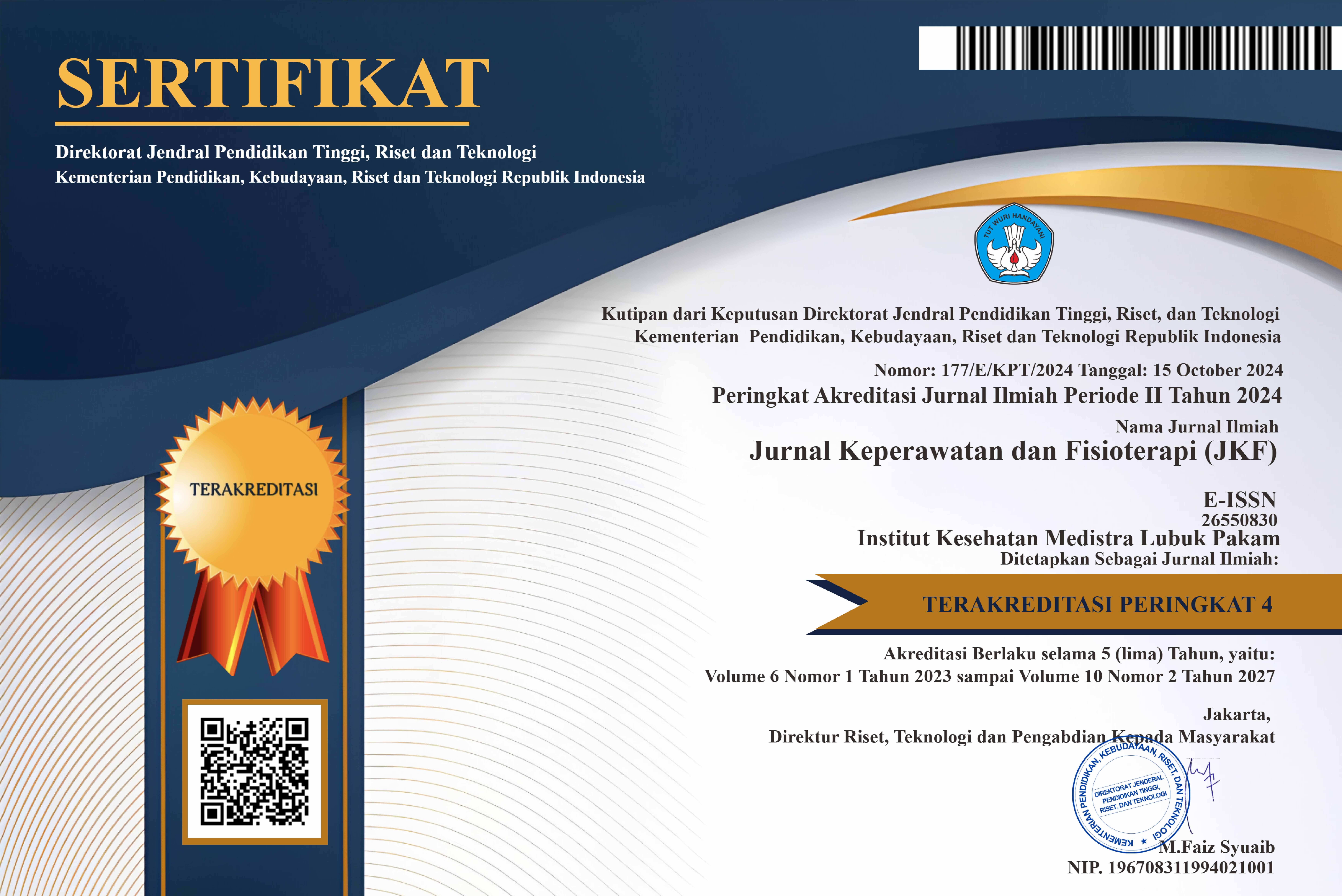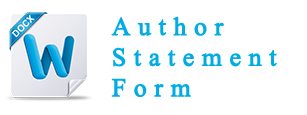Effect Of Progressive Muscle Relaxation And Deep Breathing On Anxiety And Quality Of Life In Patients Covid-19
DOI:
https://doi.org/10.35451/jkf.v5i1.1400Keywords:
Progressive Muscle Relaxation (PMR), Deep Breathing (DB), Anxiety, Quality of Life, COVID-19Abstract
The Covid-19 disease that was detected at the end of 2019 quickly caused a pandemic, and became a global health issue. Progressive Muscle Relaxation (PMR) and Deep Breathing (DB) are exercises that can reduce blood pressure, heart rate, stress, lactic acid production, anxiety and pain. The purpose of the study was to assess the effect of PMR and DB on anxiety (anxiety) and quality of life (quality of life) of COVID-19 patients. The research design used a quasi-experimental with pretest and posttest with the control group. The research was conducted at Grandmed Lubuk Pakam Hospital. The sampling technique used purposive sampling, with a sample of 28 people, with 14 people in each group. Data were analyzed using paired t test. The procedure was carried out with 30 minutes of treatment every day for 5 consecutive days. There was a significant effect between the mean anxiety score before 43.08 (SD ±4.22) and after treatment 45.67 (SD ±2.41) and Quality of Life before 24.43 (SD±4.58) and after treatment 26.07 (SD ±3.58). The results of the difference in mean obtained p value = 0.00 on anxiety, and p = 0.01 on quality of life, or p value < 0.05. The results of the study concluded that there was a significant difference in the average difference between the PMR and DB intervention groups in reducing anxiety and increasing quality of life in Covid-19 patients. It is recommended for nurses to make PMR and DB one of the independent nursing interventions in providing nursing care to Covid-19 patients.
Downloads
References
Aksu NT, Erdogan A, Ozgur N. (2018). Effects of progressive muscle relaxation training on sleep and quality of life in patients with pulmonary resection. Sleep Breath. 22(3):695‐702
Chegeni PS, Gholami M, Azargoon A, Pour AHH, Birjandi M, Norollahi H. (2018). The effect of progressive muscle relaxation on the management of fatigue and quality of sleep in patients with chronic obstructive pulmonary disease: a randomized controlled clinical trial. Complement Ther Clin Pract.
Huang Y, Zhao N. (2020). Generalized anxiety disorder, depressive symptoms and sleep quality during COVID‐19 outbreak in China: a web‐ based cross‐sectional survey. Psychiatry Res.
Jalalmanesh SH, Zargarani F. (2015). Effects of progressive muscle relaxation technique on fatigue and sleep quality in patients with multiple sclerosis. Sci J Hamadan Nurs Midwifery Faculty.
Kong X, Zheng K, Tang M, et al. (2020). Prevalence and factors associated with depression and anxiety of hospitalized patients with COVID‐19. MedRxiv.
Liu K, Chen Y, Wu D, Lin R, Wang Z, Pan L. (2020). Effects of progressive muscle relaxation on anxiety and sleep quality in patients with COVID‐19. Complement Ther Clin Pract.
M. M. D. S. Felix, M. B. G. Ferreira, L. F. Oliveira, E. Barichello, S. Pires, and M. H. Barbosa. (2018). Guided imagery relaxation therapy on preoperative anxiety: a randomized clinical trial. Revista Latino-Americana De Enfermagem, vol. 26, p. e3101
Monico‐Neto M, dos Santos RVT, Antunes HKM. (2020). The world war against the COVID‐19 outbreak: don't forget to sleep. J Clin Sleep Med.
Speth MM, Singer‐Cornelius T, Oberle M, Gengler I, Brockmeier SJ, Sedaghat AR. (2020). Mood, anxiety and olfactory dysfunction in COVID‐ 19: evidence of central nervous system involvement? Laryngoscope.
Vitale JA, Perazzo P, Silingardi M, Biffi M, Banfi G, Negrini F. (2020). Is disruption of sleep quality a consequence of severe Covid‐19 infection? A case‐series examination.
World Health Organisation (WHO). (2020). Coronavirus disease (COVID‐19) Dashboard. https://covid19.who.int/
X. Ma, Z.-Q. Yue, Z.-Q. Gong et al., (2017). Effect of diaphragmatic breathing on attention, negative affect and stress in healthy adults. Frontiers in Psychology, vol. 8
Xiao H, Zhang Y, Kong D, Li S, Yang N. (2020). Social capital and sleep quality in individuals who self‐isolated for 14 days during the coronavirus disease 2019 (COVID‐19) outbreak in January 2020 in China. Med Sci Monitor Int Med J Exp Clin Res.
Yang L, Wu D, Hou Y, et al. (2020). Analysis of psychological state and clinical psychological intervention model of patients with COVID‐19. medRxiv.
Zhang J, Xu D, Xie B, et al. (2020). Poor‐sleep is associated with slow recovery from lymphopenia and an increased need for ICU care in hospitalized patients with COVID‐19: a retrospective cohort study. Brain Behav Immun.
Downloads
Published
Issue
Section
License
Copyright in each article is the property of the Author.


























